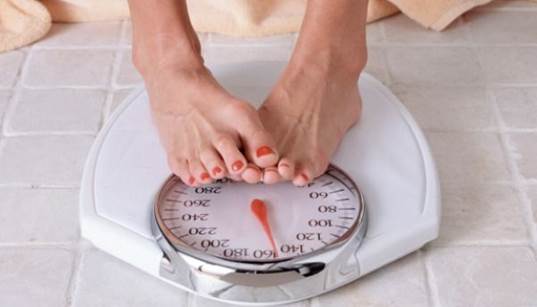You work out to lose weight, right?
But new research suggest unless you do it properly, you could end up gaining
pounds
Why do we exercise? Fear of ‘being fat’
certainly motivates many of us in our fitness regimes. The health problems that
often accompany a bulging waistband are the reasons the NHS and other health
experts encourage us to do 30 minutes of activity five times a week.
It’s simple – if you’re carrying extra
pounds, you should work out, to torch calories, lose weight and bolster health.
And, since the energy you use to exercise comes from your food and fat stores,
this theory makes sense. But is it really that straightforward? Well, perhaps
not. There’s increasing evidence that exercise isn’t always guaranteed to shed
pounds and sculpt toned lean bodies.

Can
Fitness Make You Fat?
A study in the International Journal of
Obesity, showed that nearly all of 12,568 regular runners gained weight and
increased waist circumference over a nice-year period. Only those who increased
their exercise intensity, or dramatically upped their mileage, bucked the
trend. Another study in The British Journal of Sports Medicine shows that 58
obese people, who completed a 12-weel aerobic exercise plan, lost an average of
just seven pounds. Many lost less and some put weight on. Add to that results
recently published in the European Heart Journal, which show nearly half of
overweight people are as metabolically fit and healthy as their slimmer
counterparts, and the rationale of ‘work out for weight loss’ starts to sound
distinctly sketchy.
Smarter sets
Worrying as this may seem, it’s not
exercising that’s the problem here, but how you work out and what you do
afterwards. ‘Exercise is great for cardiovascular health, but diet is key to
fat loss’, says metabolic dietician Kit Kaalund Hansen. ‘Personal trainers of
ten say that the importance in ratio of diet to exercise is 20:80 I think you
should turn that around to 80:20’.
So are our sweat sessions a waste of time?
Sometimes, says trainer Jon Stratford (commanadoactive.com). ‘Nutrition is keys
but exercise choice is important, too. People don’t change their type of
training often enough, and the body becomes accustomed to it. So it requires
less effort and energy to do that regime’.

Exercise
is great for cardiovascular health, but diet is key to fat loss
Other experts agree. ‘I’ve met many people
who’ve trained for years and not lost any weight’, says weight-loss expert
Louise Parker. ‘Weight-loss is simple, but most people are not well informed.
They’re training incorrectly and eating the wrong things’.
If you want to get more bangs for your buck
on the gym floor, many experts are quick to suggest short-and-sweet sessions.
‘Too many people think that low-intensity steady-state training (or LISS), such
as jogging for ages, is the most efficient way to lose pounds – it’s not; you
should go for high-intensity interval training (HIIT)’, says Stratford. And
make your muscles work harder by adding weight to strength work, increasing the
tempo of cardio and reducing your rest between sets.
Cut the calories
Sounds sensible, but there are still more
issues to consider. Researchers at Louisiana State University claim that
working out can lead to a compensatory mechanism that slows down weight-loss.
In a telling study, the researchers put hundreds of overweight women on various
six-month exercise regimes and one non-exercise schedule. All women maintained
their existing diets and, amazingly, there wasn’t much difference in overall
body fat loss between participants. The researchers concluded that the
exercisers doing the most activity rewarded themselves with high-calorie foods
that cancelled out their fat loss.

The
researchers concluded that the exercisers doing the most activity rewarded
themselves with high-calorie foods that cancelled out their fat loss.
This could be because exercise makes you
hungrier by upping your levels of the appetite-stimulating hormones, insulin
and lepton. And the urge to refuel may hit women harder, as our bodies fight to
cling on the energy for a potential pregnancy. ‘Women are more likely to reach
for the biscuit tin because they experience a long-term increase in insulin and
lepton’, says Hansen. Plus, it doesn’t help that the body diverts blood flow
from the digestive tract during exercise, and focuses its energy on cooling
down. Once body temperature has returned to normal blood flow to the digestive
system increases and an insatiable appetite returns Choice of exercise may also
play its parts in the battle against the bulge and here’s another thumbs-up for
HIIT training. A study form Loughborough University shows that intense exercise
suppresses appetite best b increasing levels of peptide YY (an
appetite-suppressing hormone) and reducing ghrelin (an appetite-stimulating hormone).
‘Any activities that boost hear rate will have this effect’. Claims Hansen,
‘and the higher the intensity of exercise, the longer the effect will last’.
The compensator trap
Ignoring post-workout hunger pangs may have
little effect, however, if your body is secretly saving the calories. In her
book The First 20 Minutes (Icon Books, $19.55), fitness expert Gretchen
Reynolds cites another problem at play – the compensator’s diet.
‘Exercise is great for heart health
and fitness, but diet is key to fat loss’
‘As a species, we’re astonishingly
efficient at clawing back calories’, says Reynolds. ‘People relying on exercise
to burn calories sometimes, without intending, move less during the day. They
grow sedentary. They sit when they once might have stood’. Science calls this
‘non-volitional exercise-induced inactivity’ and it can happen without you even
realizing!
Research from the University of Copenhagen
backs Reynolds up. The scientists put 61 sedentary and moderately overweight
participants on one of three activity plans – one group remained sedentary;
another did 30 minutes of moderate exercise every day and a third group
exercised vigorously for an hour a day. Surprisingly, results showed that the
‘moderate’ exercise group lost more weight than the intense exercises. Why?
Motion detector reports show that the vigorous exercisers spent most of their
non-exercisers moved more throughout the day.
So is the ‘exercise makes you fat’ message
misguided? ‘It’s irresponsible’, says Hansen. ‘What people may not realize is
that exercise doesn’t have to mean going to the gym six days a week. It can be
as simple as a brisk walk to work or kicking a football around with family.
It’s important to remember that aerobic exercise is also essential for good
cardiovascular health, and even those who are naturally skinny need to exercise
to protect their heart’.
So, now we know – and what a relief. Time
to HIIT the gym, maybe?
5 ways to make workouts work
·
Don’t make exercise a chore. Walk to work, train
with friends – fun fitness is essential for meeting long-term goals.
·
Do mix some resistance training into a cardio
plan to fire-up your fat burners.
·
Don’t be gluttonous. Eat well and be mindful of
post-workout portion sizes.
·
Do take body measurements with calipers or a
tape measure, for an accurate fat stat.
·
Don’t train aimlessly! Do high-intensity
sessions a few times each week to rev up your metabolism.